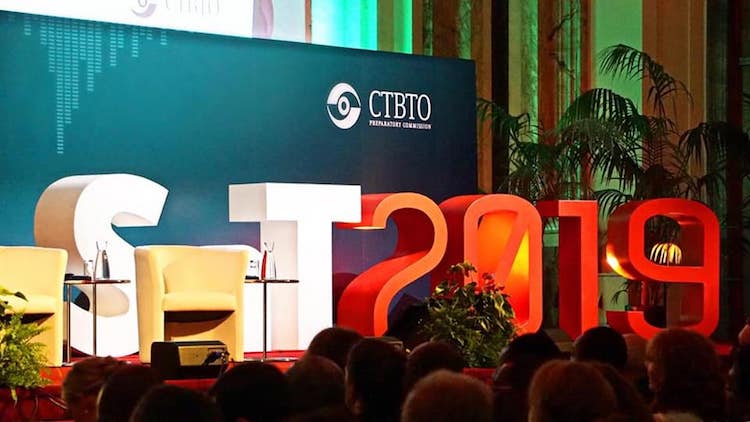By Jamshed Baruah
VIENNA (IDN) – Strongly pleading for a legally binding universal prohibition of nuclear tests, CTBTO Executive Secretary Lassina Zerbo has said that an early entry into force of the Comprehensive Nuclear-Test-Ban Treaty (CTBT) in a state of limbo for 23 years will positively influence the outcome of the 2020 NPT Review Conference.
Zerbo was opening a five-day multidisciplinary conference on intended to further enhance the strong relationship between the scientific and technological community and policy-makers as well the Comprehensive Nuclear-Test-Ban-Treaty Organization (CTBTO).
The CTBT: Science and Technology 2019 Conference (SnT2019) that kicked off on June 24 at the Hofburg Palace in Vienna, Austria, is the seventh in a series that has brought together scientists, industry leaders, policymakers, civil society and academia from around the world to exchange knowledge and share advances in the monitoring and verification technologies relevant to the CTBT.
Among highlights of the conference are discussions on the challenges of communicating science to wider audiences, on how CTBT data can contribute to civil applications such as studying climate change and mitigating disaster risks, on artificial intelligence, and on the importance of science to policy and diplomacy.
There is also a special focus on youth involvement, including an awards ceremony for an international childrens’ art competition run in collaboration with the Spanish NGO Paz y Cooperaciόn.
CTBTO Executive Secretary Zerbo said: “As we look at the world today, I understand very well the temptation to give in to cynicism where nuclear non-proliferation and disarmament is concerned. But the message I want this Conference to deliver is that there is good news to share and there are valuable assets we can build on.”
For example, there are over 300 International Monitoring System installations positioned around the globe, sending data to the International Data Centre in Vienna. In fact, the CTBTO already provides a level of nuclear test detection capability that few thought would be possible when the Treaty was first negotiated.
Over 90% of CTBT facilities have been built and transmit data, allowing States Signatories to draw an independent conclusion on the nature of events picked up by the system – and ultimately determine whether a nuclear explosion has occurred. This corresponds to approximately 14 TB of data per year, making the CTBT second to none when it comes to monitoring – and better understanding – our planet.
“The strong performance of the verification regime for nuclear test monitoring and other purposes is borne out by the abstracts, posters, and oral presentations to be made here this week. This demonstrates clearly that the CTBT is not a theoretical treaty: it has a real impact,” Zerbo said.
Article XIV of the Treaty notes that it will enter into force 180 days after the date of deposit of the instruments of ratification of the 44 States listed in Annex 2. These 44 States participated in the negotiations of the Treaty in 1996 and possessed nuclear power or research reactors at the time.
Among Article XIV states that have not yet ratified the Treaty are: China, Democratic People’s Republic of Korea, Egypt, India, Iran, Israel, Pakistan and the United States.
With this in view, Zerbo said: “Delivering on the CTBT is key to rebuilding the trust needed for the way ahead,” and went on to say: “Action on the Treaty would provide the progress that we need to see in the run up to next year’s NPT Review Conference.”
Given that CTBT verification is up and running and that there is a de-facto global moratorium on nuclear tests, added the CTBTO Executive Secretary, “entry into force is the most effective disarmament measure within the grasp of the international community”.
All States have the responsibility to pass on the hard-won gain of the CTBT to future generations, Zerbo said, and added. “The progress that we make on locking in the nuclear test ban, on both the scientific and diplomatic fronts, will determine how successful we are in reaching our ultimate goal of making the world more safe, secure and prosperous.”
At the High-Level Panel “CTBT: Science and Technology in a Changing World”, Izumi Nakamitsu, UN High Representative for Disarmament Affairs (UNODA), praised the CTBTO, describing it as “a leader when it comes to using technology in our field”.
She added: “With the vast amounts of data, it continually processes, the International Monitoring System is a prime candidate for the application of advanced data processing techniques.” She applaud the CTBTO for having taken the initiative to implement software that uses state of the art machine learning and artificial intelligence to complement the established analysis tools. [IDN-InDepthNews – 24 June 2019]
Photo credit: CTBTO
SUPPORT US in Speaking Out for People, Planet and Peace.
IDN is flagship agency of the International Press Syndicate.
facebook.com/IDN.GoingDeeper – twitter.com/InDepthNews
Send your comment: comment@indepthnews.colo.ba.be
Subscribe to IDN Newsletter: newsletter@indepthnews.colo.ba.be

